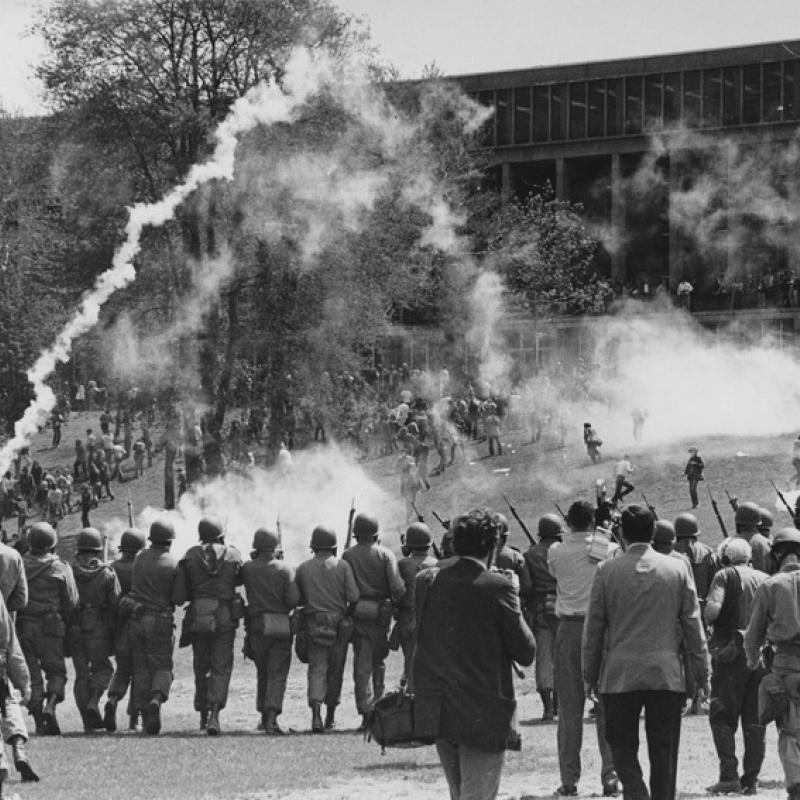History
Select Topics
Select Air Date
Select Segment Types
All Subtopics
- 1920s
- 1950s
- 1960s
- 1970s
- 1980s
- 9/11
- Abu Ghraib Prison
- Afghan War (2001-2021)
- American Civil War (1861-1865)
- Apartheid
- Arab Spring (2010-)
- Arab-Israeli Conflict
- Arafat, Yasir, 1929-2004
- Bin Laden, Osama, 1957-2011
- Bombardment of Hiroshima-shi (Japan : 1945)
- Boston Marathon Bombing (Boston, Massachusetts : 2013)
- Bstan-ʼdzin-rgya-mtsho, Dalai Lama XIV, 1935-
- Capone, Al, 1899-1947
- Castro, Fidel, 1926-
- Civil War (Chechni︠a︡ : 1994-)
- Civil War (Lebanon : 1975-1990)
- Civil War (Rwanda : 1994)
- Civil War (Sierra Leone : 1991-2002)
- Civil War (Syria : 2011-)
- Cold War (1945-1989)
- Cuban Missile Crisis (1962)
- Cultural Revolution (China : 1966-1976)
- Evacuation and relocation of Japanese Americans (United States : 1942-1945)
- Freedom Rides (1961)
- Global Financial Crisis (2008-2009)
- Gorbachev, Mikhail Sergeevich, 1931-
- Great Depression
- Hitler, Adolf, 1889-1945
- Holocaust, Jewish (1939-1945)
- Hurricane Katrina (2005)
- Hussein, Saddam, 1937-2006
- Iran Hostage Crisis (1979-1981)
- Iran-Contra Affair (1985-1990)
- Iraq & Afganistan Wars
- Iraq-Kuwait Crisis (1990-1991)
- King, Martin Luther, Jr., 1929-1968
- Korean War (1950-1953)
- Kosovo War (Serbia : 1998-1999)
- Lindbergh, Charles A. (Charles Augustus), 1902-1974
- Nazis
- Oklahoma City Federal Building Bombing (Oklahoma : 1995)
- Oswald, Lee Harvey
- Partition of India (1947)
- Pentagon Papers
- Persian Gulf War (1991)
- Pinochet Ugarte, Augusto
- Postwar reconstruction
- Prohibition
- Project Apollo (U.S.)
- Rabin, Yitzhak, 1922-1995
- Rodney King Riots (Los Angeles, California : 1992)
- Selma to Montgomery Rights March
- September 11, 2001
- Siege of Sarajevo (Bosnia and Herzegovina : 1992-1996)
- Somalia Affair (1992-1997)
- South Africa
- Soviet Occupation of Afghanistan (1979-1989)
- Soviet Union
- Stalin, Joseph, 1878-1953
- Student Nonviolent Coordinating Committee (U.S.)
- Tea Party Movement
- Thatcher, Margaret
- U.S. Civil War
- U.S. History
- U.S. Slavery
- Vietnam War
- Voting Rights Act of 1965 (United States)
- War on Terrorism
- Watergate Affair (1972-1974)
- World War I (1914-1918)
- WWII
- Yeltsin, Boris Nikolayevich, 1931-2007
- Yugoslav War (1991-1995)

